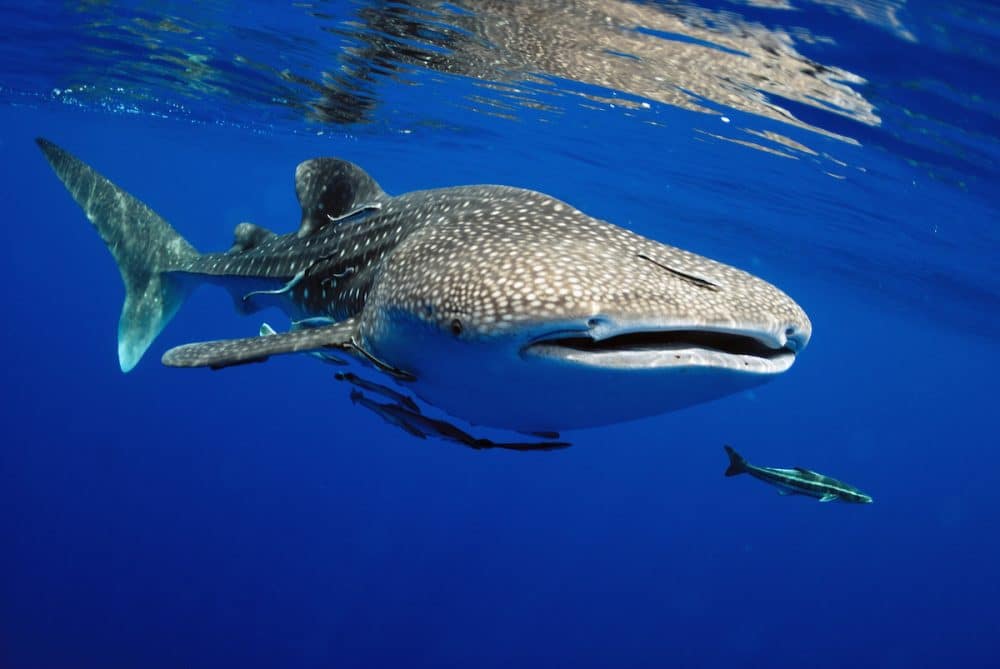
The Gulf of Mexico off of Pinellas County is truly amazing. Not only is it beautiful with the crystal clear green-blue tropical waters, but you never know what fish and wildlife you will see. If you haven’t seen the news this week, the media are all reporting that a fisherman aboard Flatliner Adventures spotted a pair of large whale sharks swimming off the coast of St. Pete this past week. They were about 30 miles west of Pass-a-Grille Beach.
The boat was on a spearfishing trip, and it turned into an incredible underwater adventure of a lifetime when fishermen spotted a whale shark, measuring up to 30 feet long. Two men that dove in 80 feet deep, recorded the encounter on video. They reported swimming with the massive whale shark for nearly an hour while even petting it.
Whale Sharks
According to the World Wildlife Fund, the whale shark is the largest shark and largest of any fishes alive today. Whale sharks feed on plankton and travel vast distances to find enough food to sustain their huge size, and to reproduce.
Whale sharks can weigh as much as 11 tons and measure as long as 40 feet long. Whale sharks are easier to be identified because they have a unique pattern of spots similar to human’s fingerprints.
They massive sharks can grow up to 40 feet long. An average whale shark grows to 18 to 32.8 feet and weighs 20.6 tons. That’s about the size of a school bus.
A whale shark’s mouth is about 5 feet wide. Being a huge whale shark, they have a lot of teeth with over 300 rows of teeth. Oddly enough, they do not use their teeth to eat because they are filter feeders.
Habitat
Whale sharks are found in warmer tropical waters all over the world, although some have been reported to be seen in cooler waters, such as those off the coast of New York. The majority (75%) of whale sharks are found in the Indian and Pacific oceans. The other 25 percent are in the Atlantic, according to the International Union for Conservation of Nature (IUCN).
Habits
Whale sharks are solitary creatures. They don’t shy away from sharing feeding grounds with other whale sharks, though. Juvenile whale sharks hang out together and eat.
Diet
These sharks aren’t like other sharks. They don’t attack and tear apart their prey. Whale sharks are filter feeders, which means they open their mouths, let the water come in, and their bodies filter out food and release the water and any debris back into the ocean. They are meat-loving carnivores.
Their primary food source for their diet is plankton, but they also eat shrimp, algae, and other marine plant material, sardines, anchovies, mackerels, squid, tuna, and albacore. They also eat fish eggs. Whale sharks are patient and will wait as long as 14 hours for fish to spawn on reefs. Then, they will swoop in and eat the eggs.
Offspring
Whale shark females produce eggs and give birth to about 300 live young. Unfortunately, many do not make it to maturity. The young hatch inside of the mother instead of in the water like most fish. Whale sharks have a long childhood. The offspring, at the age of 25, are ready to have their own young. They may live 100 to 150 years.
Classification / Taxonomy
This is the classification of whale sharks:
Kingdom: Animalia Subkingdom: Bilateria Infrakingdom: Deuterostomia Phylum: Chordata Subphylum: Vertebrata Infraphylum: Gnathostomata Superclass: Chondrichthyes Class: Chondrichthyes Subclass: Elasmobranchii Superorder: Euselachii Order: Orectolobiformes Family: Rhincodontidae Genus: Rhincodon Species: Rhincodon typus
Endangered
According to the IUCN, the Indo-Pacific population of the whale shark is thought to have reduced 63 percent over the past 75 years. The population in the Atlantic is believed to have been reduced by more than 30 percent. The populations are continuing to decrease. Due to the decreasing population, whale sharks are classified as endangered. This is heartbreaking. Unfortunately, it may not be long until there are none left whatsoever. Unless of course, people decide to create fundraising events to help support wildlife programs and endangered species. You can learn more here, (https://www.gofundme.com/c/blog/help-endangered-species). With increased awareness and funds for these vital charities and programs, the whale sharks, and any other animal that poses the risk of extinction, can be protected, ensuring that the species that are left can continue to live.
Captain Brian Mathay
Looking for a fun and exciting day on the water? Look no further than Clearwater Inshore Fishing owned and operated by Captain Brian Mathay. Book your fishing charter today or call at (727) 667-8291.







